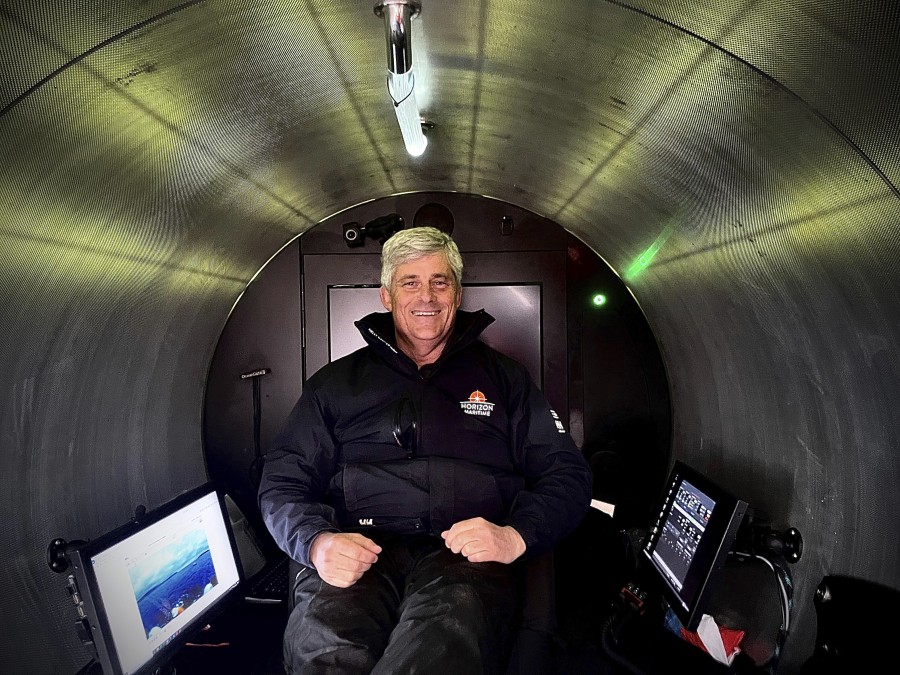SEATTLE — OceanGate Expeditions confirmed Thursday that its CEO, Stockton Rush, is among the five who died aboard Titan, the deep-sea submersible that imploded on its way to the Titanic wreckage.
In a news release, the Everett-based company called Rush and the four others killed — Shahzada Dawood and his son Suleman Dawood, Hamish Harding and Paul-Henri Nargeolet — “true explorers,” who all shared a “distinct spirit of adventure and a deep passion for exploring and protecting the world’s oceans.”
OceanGate’s office at the Port of Everett is closed indefinitely, the port said in a statement Thursday. “Today’s news about the Titan and those on board is beyond devastating, and not the outcome we were hoping to hear,” port CEO Lisa Lefeber said.
“Our hearts are with these five souls and every member of their families during this tragic time. We grieve the loss of life and joy they brought to everyone they knew. This is a very sad time for the entire explorer community, and for each of the family members of those lost at sea,” the company wrote.
Scott Parazynski, a physician, astronaut and member of OceanGate’s board of directors, wrote on Twitter that the members of the Titan crew were “wonderful explorers, Dads, Sons, Husbands and Friends — all of whom were champions of ocean conservation and discovery.”
To further ocean conservation, Rush and his wife Wendy ran the OceanGate Foundation, a nonprofit based in Seattle that provided grants in support of scientific and archaeological marine research, according to the foundation’s website.
Harding, another one of the passengers on the Titan, was also connected to Blue Origin, the Kent-based aerospace company owned by Amazon founder Jeff Bezos. Harding participated in a flight to space on Blue Origin’s New Shepard rocket as a commercial astronaut, according to a statement from Action Aviation, an aviation-sales company Harding founded.
Harding was a “passionate explorer — whatever the terrain — who lived his life for his family, his business and for the next adventure,” Action Aviation managing director Mark Butler wrote in a statement.
Gov. Jay Inslee shared his condolences to the Titan crew and their families. “The international search gripped the world for days and I’d like to recognize the dedicated work of the Coast Guard that is so protective of Washingtonians and everyone in our waters,” he said in a tweet.
For years, Rush dreamed of planting his feet anywhere but on Earth’s surface — the moon, Mars — anywhere but solid land.
“I wanted to be an astronaut,” he said at a 2017 New York City’s Explorers Club lecture, a place where a guest might actually meet someone who’s escaped our planet’s gravitational grasp.
Rush, who was 61, grew up in a family of wealthy industrialists and benefactors, watched “Star Trek” and “Star Wars” as a youth, and earned an aerospace engineering degree to one day have the opportunity to “see those alien life-forms,” he said in 2017.
Rush became a pilot, and at only 19, was the youngest jet-transport-rated pilot in the world, according to his company bio. Rush continued over decades as a flight test engineer and board member and chair of manufacturing and technology companies.
“I eventually realized I wasn’t going to get to Jupiter or Mars,” he had continued at the Explorers Club lecture, which was OK, he said, because he realized “all the cool stuff I thought was out there is actually underwater.”
So began Rush’s journey to the great depths of the ocean.
He founded OceanGate in 2009, beginning with a five-person submarine purchased from a private owner. The submarine Antipodes was introduced the next year and made 130 dives within two years. Along with two submarines, he began making his own vessel, a submersible — different from a submarine because it needs a mothership — made from carbon fiber. He called it Cyclops, which served as a prototype and platform for Titan.
OceanGate was recently valued at $60 million, according to S&P Global Market Intelligence records.
Rush was interviewed often, showing reporters the ins and outs of OceanGate’s deep-sea vessels and talking about his ambitious endeavors to take researchers and private citizens to the Titanic wreckage, about 12,500 feet below the surface of the North Atlantic Ocean.
It was on one such eight-day expedition this past weekend when Titan went missing about an hour and 45 minutes after its initial descent to the Titanic site.
The OceanGate vessels have gone on dozens of dives throughout the Puget Sound region and around the world. On one expedition in 2014, rapper Macklemore went aboard Antipodes into Elliott Bay to find bluntnose sixgill sharks, in a dive that was documented by the Discovery Channel’s “Daily Planet” for Shark Week, according to OceanGate’s website.
In 2018, OceanGate worked with the SeaDoc Society for a Salish Sea expedition, doing seven dives in Cyclops 1 off San Juan Island over five days.
Titan had the capability of going eight times deeper than Cyclops, and in 2021 and 2022 OceanGate completed expeditions to the Titanic site. The goal was to take researchers and “mission specialists” on board, charging up to $250,000 for a seat. One reason for the focus on Titanic, Rush said in a 2019 Smithsonian Magazine story, was because everyone seems to know about it.
“If you ask people to name something underwater, it’s going to be sharks, whales, Titanic,” he said in the story.
The company has been the subject of at least one lawsuit related to Titan, filed in 2018 by an employee who said he had safety concerns about the vessel. The case was settled out of court, according to court documents. That same year, a marine technology group wrote to Rush that members were concerned about Titan and negative outcomes.
The letter, sent by the Manned Underwater Vehicles committee of the Marine Technology Society, was obtained by The New York Times. The group described outcomes from minor to catastrophic, which “would have serious consequences for everyone in the industry.”



